While sorting your plastic recycling might be frustrating, scientists warn that a lack of waste collection could be deadly for millions around the world.
Scientists from the University of Leeds have used AIÂ modelling to reveal the 10 countries responsible for the most plastic pollution.Â
Overall, the researchers calculate that 52 million tonnes of uncollected plastic waste entered the environment in 2020, creating a serious health risk for those exposed.Â
India topped the table as the biggest producer of plastic pollution – creating 9.3 million tonnes of waste in a single year – followed by Nigeria and Indonesia.Â
Lead author Dr Costas Velis says: ‘This is an urgent global human health issue — an ongoing crisis: people whose waste is not collected have no option but to dump or burn it.’
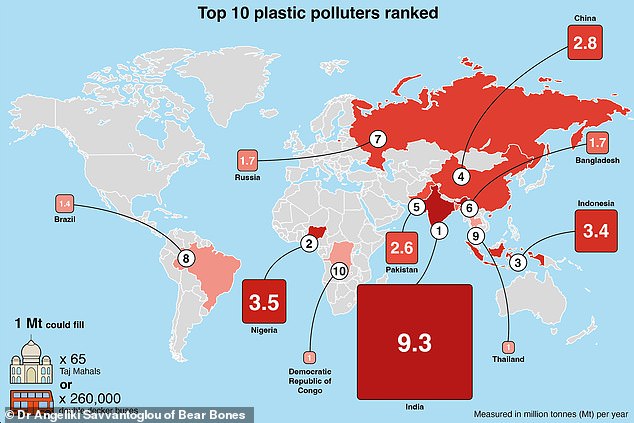
A new report reveals the top ten countries responsible for the most plastic pollution, with India topping the list with 9.3 million tonnes of wasteÂ
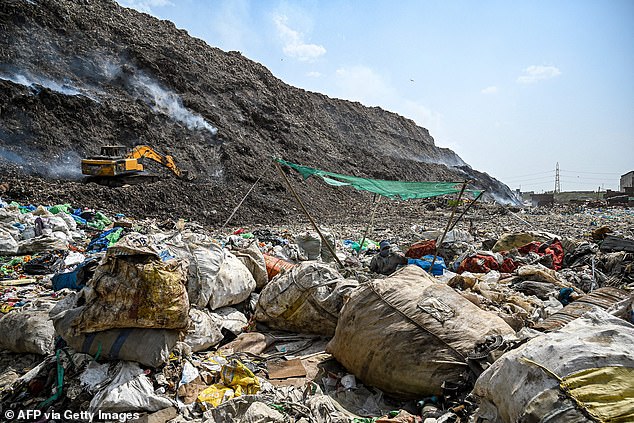
Researchers used AI to predict how much waste each country produced and what happened to it. Due to its large population, India produced more than a fifth of the world’s uncollected waste. Pictured: Rubish is burned in New Delhi, IndiaÂ
Top 10 plastic polluters India:Â 9,275,777 tonnes/yearNigeria:Â 3,532,479 tonnes/yearIndonesia:Â 3,352,229Â tonnes/yearChina:Â 2,808,179Â tonnes/yearPakistan:Â 2,567,461Â tonnes/yearBangladesh:Â 1,748,215Â tonnes/yearRussia:Â 1,702,453Â tonnes/yearBrazil:Â 1,444,824Â tonnes/yearThailand:Â 995,718Â tonnes/yearDemocratic Republic of the Congo:Â 963,328Â tonnes/year
Â
Based on data gathered from 500 cities across 127 countries, the researchers were able to use AI predict how much waste was produced annually and what happened to it.
Each year, the researchers predict that more than 400 million tonnes of plastic is produced – 52 million tonnes of which are either burned or dumped out in the open.
For context, that would be enough rubbish to cover the entirety of Greater London in a one-metre-thick layer of waste.
While previous studies predicted that China was the biggest contributor to plastic pollution, this study shows that it is actually India which claims the top spot.
Due to its massive population of 1.4 billion people and poor rubbish collection, the nation produced around a fifth of the world’s uncollected plastic in 2020.
India’s plastic waste problem is so large that it produced more than the second and third biggest polluters – Nigeria and Indonesia – combined.
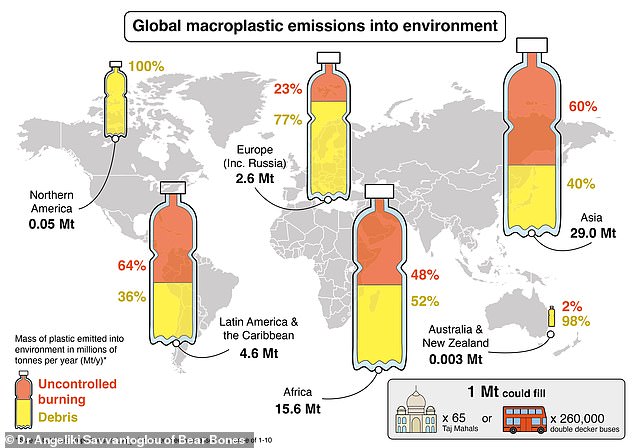
Asia and Africa are responsible for a large proportion of the world’s plastic pollution. Worryingly, large amounts of the waste in these regions is burned without any safety measures in placeÂ
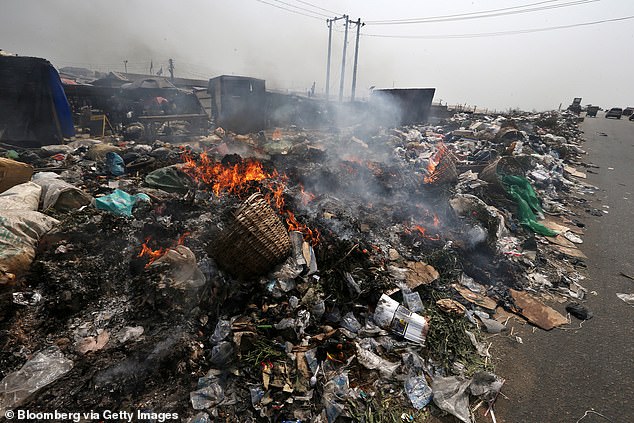
Nigeria produced the second most plastic waste, putting 3.5 million tonnes of waste into the environment each year. Pictured: burning waste in Yenagoa, NigeriaÂ
The second biggest plastic polluter, Nigeria, produced 3.5 million tonnes of waste which was closely followed by Indonesia in third place with 3.4 million tonnes.
Once the world’s biggest plastic polluter, this study found that China has now fallen into fourth place with 2.8 million tonnes, thanks to improved collection and processing services.
The study also found that while Europe and America have a high demand for plastic products, these countries tend to produce less waste due to better processing services.
The UK ranked 135th for plastic waste production, creating only 4,000 tonnes a year, which mainly came from littering.
The US meanwhile came in at 90th with 47,649 tonnes per year – more than 10 times the amount produced in the UK.Â
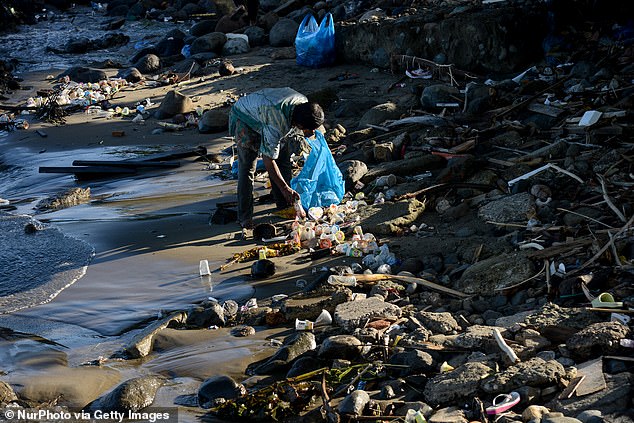
Indonesia produced the third highest level of plastic pollution. Due to a large population and poor refuse collection services. the nation created 3.4 million tonnes in 2020. Pictured: a person collecting plastic water bottles in Padang City
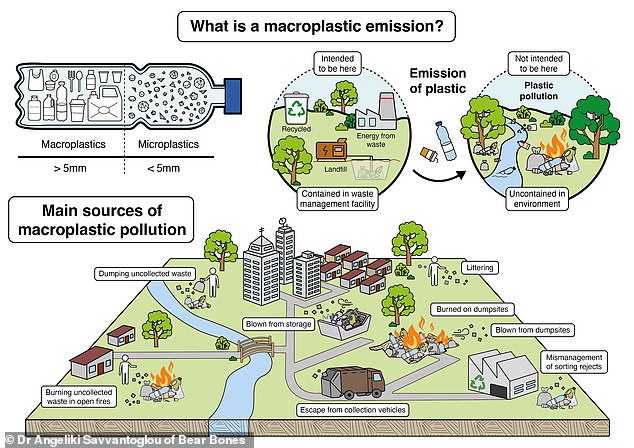
The researchers found that 52 million tonnes of plastic waste was left uncollected each year and allowed to enter the environment. Some of this was dumped or burned while some of it comes from sources such as littering or missorting recyclingÂ
Some of the biggest areas of concern were located in sub-Saharan Africa, such as the Democratic Republic of the Congo which was the tenth biggest producer with one million tonnes.
While countries in this region produce less plastic overall, the modelling found that they produce extremely high amounts of plastic per capita.
On average, countries in sub-Saharan Africa produced 12kg of plastic pollution per person in 2020 – equivalent to 400 plastic bottles per year.
For comparison, the UK only produces about three plastic bottles worth of plastic pollution per person each year.
What makes this particularly concerning is that large amounts of uncollected plastic waste ultimately ends up being burned.
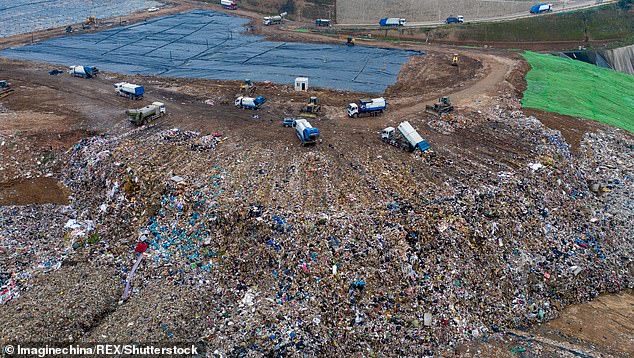
China, once the world’s largest producer of plastic waste, is now the fourth biggest polluter and creates 2.8 million tonnes each year thanks to improving management systems. Pictured: Workers sort waste at a landfill in Xi’an, ChinaÂ
In 2020, more than half of all uncollected waste was burned without any environmental controls in place, amounting to 30 million tonnes of plastic.
Dr Velis says: ‘Setting the plastics on fire may seem to make them “disappear”, but in fact the open burning of plastic waste can lead to substantial human health damage including neurodevelopmental, reproductive and birth defects; and much wider environmental pollution dispersion.’
Those health impacts are felt most by those in the poorest countries around the world who have no access to alternative disposal systems.
The researchers’ modelling found that 15 per cent of the world’s population is living without access to waste collection systems.
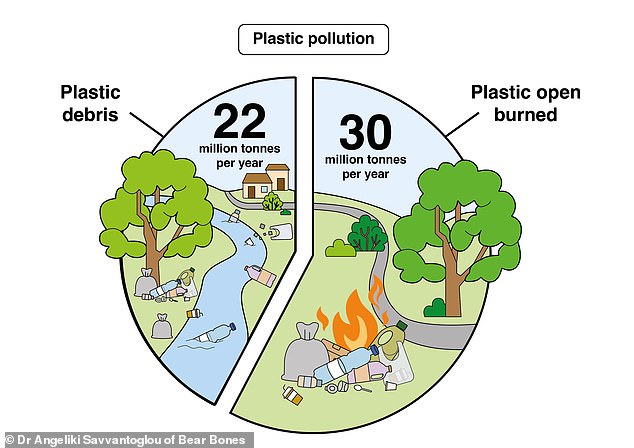
One of the more concerning issues is that 30 million tonnes of plastic were burned each year, this produces pollution which can cause serious health issues for those exposed to itÂ
These inequalities are made worse by the fact that waste from some richer countries is disposed of by exporting it abroad.Â
It is illegal in the UK to export waste unless it is intended to be recycled but investigations have found British waste dumped on Turkish roadsides and in Indonesian landfills.Â
Dr Josh Cottom, also of Leeds University, says: ‘The health risks resulting from plastic pollution affect some of the world’s poorest communities, who are powerless to do anything about it.’
‘By improving basic solid waste management, we can both massively reduce plastic pollution and improve the lives of billions.’
Which countries produce the most plastic waste? India: 9,275,777Nigeria: 3,532,479Indonesia: 3,352,229China: 2,808,179Pakistan: 2,567,461Bangladesh: 1,748,215Russia: 1,702,453Brazil: 1,444,824Thailand: 995,718Democratic Republic of the Congo: 963,328Philippines: 819,843Egypt: 807,596Iraq: 799,891Tanzania: 778,932Mexico: 767,447Vietnam: 754,959Myanmar: 725,433Ethiopia: 651,876Uganda: 617,565South Africa: 609,757Kenya: 602,475Iran: 560,725Angola: 550,441Sudan: 529,961Turkey: 486,398Afghanistan: 457,234Cameroon: 432,957Ukraine: 417,655Cambodia: 413,564Uzbekistan: 395,211CĂ´te d’Ivoire: 394,834Ghana: 385,727Morocco: 385,558Algeria: 379,622Argentina: 350,880North Korea: 344,633Syria: 328,329Yemen: 327,239Mozambique: 323,380Sri Lanka: 273,779Peru: 270,769Guatemala: 263,614Venezuela: 249,864Nepal: 238,989Kazakhstan: 238,988Haiti: 229,493Somalia: 225,305South Sudan: 215,243Zambia: 215,139Senegal: 214,610Chad: 211,833Mali: 205,639Rwanda: 201,068Malaysia: 197,552Madagascar: 190,784Burkina Faso: 185,331Malawi: 171,474Benin: 168,522Zimbabwe: 162,871Tajikistan: 156,028Paraguay: 154,547Colombia: 153,451Burundi: 145,231Romania: 141,944Tunisia: 129,723Papua New Guinea: 129,684Laos: 127,090Honduras: 126,403Serbia: 126,143Jordan: 124,391Niger: 122,201Kyrgyzstan: 118,570Togo: 99,108Nicaragua: 99,108Azerbaijan: 90,491El Salvador: 89,809Ecuador: 88,460Guinea: 85,918Mauritania: 83,749Republic of Congo: 79,951Bolivia: 79,523Dominican Republic: 79,382Turkmenistan: 70,966Liberia: 60,755Sierra Leone: 59,936Belarus: 55,703Central African Republic: 50,706Bulgaria: 50,612Cuba: 48,447United States: 47,649Lesotho: 44,823Eritrea: 43,719Lebanon: 43,520Panama: 41,213Libya: 40,313Namibia: 36,896Bosnia and Herzegovina: 33,423Equatorial Guinea: 33,101Mongolia: 32,469Botswana: 32,272Gambia: 29,142Palestina: 28,427Georgia: 27,950Costa Rica: 24,190Jamaica: 23,653Albania: 22,259Guinea-Bissau: 22,175Kosovo: 20,974Swaziland: 20,084Djibouti: 19,978Timor-Leste: 18,139Moldova: 17,712Macedonia: 16,312Armenia: 15,872Comoros: 11,306Chile: 11,283Solomon Islands: 8,956France: 8,832Gabon: 7,838Germany: 7,725Italy: 7,684Poland: 7,079Maldives: 7,015Belize: 6,972Trinidad and Tobago: 6,962Guyana: 6,907Spain: 6,241Vanuatu: 6,209Japan: 6,185Fij:i 6,182Montenegro: 5,762Bhutan: 5,694Cape Verde: 5,693Western Sahara: 4,736United Kingdom: 4,622Suriname: 4,199SĂŁo TomĂ© and PrĂncipe: 3,681Saudi Arabia: 3,444Mayotte: 3,079Canada: 3,024Oman: 3,019South Korea: 2,857Hungary: 2,707Samoa: 2,613Mauritius: 2,544Australia: 2,198Greece: 1,909Puerto Rico: 1,909Czech Republic: 1,549Taiwan: 1,398Lithuania: 1,393Micronesia: 1,361Kiribati: 1,354Austria: 1,239Saint Lucia: 1,185Portugal: 1,181Belgium: 1,167Netherlands: 1,156Tonga: 1,123Slovakia: 1,087Uruguay: 961Latvia: 956Sweden: 918United Arab Emirates: 918French Guiana: 916Croatia: 901Dominica: 798Switzerland: 731Grenada: 694Finland: 663Ireland: 659Saint Vincent and the Grenadines: 607Denmar:k 606Israel: 605Norway: 527Slovenia: 525New Zealand: 518Marshall Islands: 465Reunion: 392Hong Kong: 341Kuwait: 273American Samoa: 238Bahamas: 237Guadeloupe: 236Estonia: 224Anguilla: 218Martinique: 197Palau: 195Singapore: 175Qatar: 171Greenland: 142Barbados: 138Seychelles: 121Wallis and Futuna: 119Curaçao: 112Tuvalu: 112Cyprus: 106New Caledonia: 99Saint Helena: 89Northern Cyprus: 89Virgin Islands, U.S.: 78Brunei: 77Antigua and Barbuda: 71Luxembourg: 69Aruba: 68Saint-Martin: 63French Polynesia: 55Bahrain: 55Christmas Island: 48Saint Kitts and Nevis: 43Guam: 41Malta: 34Cayman Islands: 32Iceland: 31Niue: 30Northern Mariana Islands: 27Macao: 25British Virgin Islands: 24Turks and Caicos Islands: 24Bonaire, Sint Eustatius and Saba: 23Sint Maarten: 21Montserrat: 20Tokelau: 16Faroe Islands: 14Andorra: 12Jersey: 10Isle of Man: 9Bermuda: 8Guernsey: 8Cocos Islands: 7Paracel Islands: 7Ă…land: 6Nauru: 6Cook Islands: 5Akrotiri and Dhekelia: 5Saint-BarthĂ©lemy: 5Liechtenstein: 5San Marino: 5Falkland Islands: 3Monaco: 2Saint Pierre and Miquelon: 1Gibraltar: 1Pitcairn Islands: 1Svalbard and Jan Mayen: 1Norfolk Island: 1Vatican City: 0
All figures in tonnes per year
Source link : http://www.bing.com/news/apiclick.aspx?ref=FexRss&aid=&tid=66d8773103ec4dc18198bdd8fad40979&url=https%3A%2F%2Fwww.dailymail.co.uk%2Fsciencetech%2Farticle-13811929%2FTop-10-countries-plastic-pollution-world.html&c=17924673331160164513&mkt=en-us
Author :
Publish date : 2024-09-04 04:01:00
Copyright for syndicated content belongs to the linked Source.












